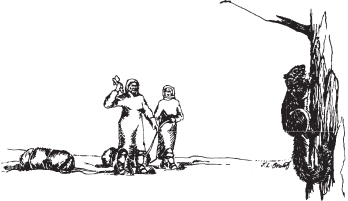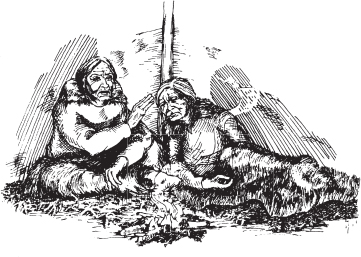
Ch’idzigyaak sat quietly as if trying to make up her confused mind. A small feeling of hope sparked in the blackness of her being as she listened to her friend’s strong words. She felt the cold stinging her cheeks where her tears had fallen, and she listened to the silence that The People left behind. She knew that what her friend said was true, that within this calm, cold land waited a certain death if they did nothing for themselves. Finally, more in desperation than in determination she echoed her friend’s words, “Let us die trying.” With that, her friend helped her up off the sodden branches.
The women gathered sticks to build the fire and they added pieces of fungus that grew large and dry on fallen cottonwood trees to keep it smoldering. They went around to other campfires to salvage what embers they could find. As they packed to travel, the migrating bands in these times preserved hot coals in hardened mooseskin sacks or birchbark containers filled with ash in which the embers pulsated, ready to spark the next campfire.
As night approached, the women cut thin strips from the bundle of babiche, fashioning them into nooses the size of a rabbit’s head. Then, despite their weariness, the women managed to make some rabbit snares, which they immediately set out.
The moon hung big and orange on the horizon as they trudged through the knee-deep snow, searching in the dimness for signs of rabbit life. It was hard to see, and what rabbits existed stayed quiet in the cold weather. But they found several old, hardened rabbit trails frozen solid beneath the trees and arching willows. Ch’idzigyaak tied a babiche noose to a long, thick willow branch and placed it across one of the trails. She made little fences of willows and spruce boughs on each side of the noose to guide the rabbit through the snare. The two women set a few more snares but felt little hope that even one rabbit would be caught.
On their way back to the camp, Sa’ heard something skitter lightly along the bark of a tree. She stood very still, motioning her friend to do the same. Both women strained to hear the sound once more in the silence of the night. On a tree not far from them, silhouetted in the now-silvery moonlight, they saw an adventurous tree squirrel. Sa’ slowly reached to her belt for the hatchet. With her eyes on the squirrel and her movements deliberately slow, she aimed the hatchet toward this target that represented survival. The animal’s small head came up instantly and as Sa’ moved her hand to throw, the squirrel darted up the tree. Sa’ foresaw this, and, aiming a little higher, ended the small animal’s life in one calculating throw with skill and hunting knowledge that she had not used in many seasons.

Ch’idzigyaak let out a deep sigh of relief. The moon’s light shone on the younger woman’s smiling face as she said in a proud yet shaky voice, “Many times I have done that, but never did I think I would do it again.”
Back at the camp, the women boiled the squirrel meat in snow water and drank the broth, saving the small portion of meat to be eaten later, for they knew that otherwise, this could be their last meal.
The two women had not eaten for some time because The People had tried to conserve what little food they had. Now they realized why precious food had not been given to them. Why waste food on two who were to die? Trying not to think about what had happened, the two women filled their empty stomachs with the warm squirrel broth and settled down in their tents for the night.
The shelter was made of two large caribou hides wrapped around three long sticks shaped into a kind of triangle. Inside were thickly piled spruce boughs covered with many fur blankets. The women were aware that, although they had been left behind to fend for themselves, The People had done them a good deed by leaving them with all their possessions. They suspected that the chief was responsible for this small kindness. Other less noble members of the band would have decided that the two women soon would die and would have pilfered everything except for the warm fur and skin clothing they wore. With these confusing thoughts lingering in their minds, the two frail women dozed.
The moonlight shone silently upon the frozen earth as life whispered throughout the land, broken now and then by a lone wolf’s melancholy howl. The women’s eyes twitched in tired, troubled dreams, and soft helpless moans escaped from their lips. Then a cry rang out somewhere in the night as the moon dipped low on the western horizon. Both women awoke at once, hoping that the awful screech was a part of her nightmare. Again the wail was heard. This time, the women recognized it as the sound of something caught in one of their snares. They were relieved. Fearing that other predators would beat them to their catch, the women hurriedly dressed and rushed to their snare sets. There they saw a small, trembling rabbit that lay partially strangled as it eyed them warily. Without hesitation, Sa’ went to the rabbit, put one hand around its neck, felt for the beating heart, and squeezed until the small struggling animal went limp. After Sa’ reset the snare, they went back to the camp, each feeling a thread of new hope.
Morning came, but brought no light to this far northern land. Ch’idzigyaak awoke first. She slowly kindled the fire into a flame as she carefully added more wood. When the fire had died out during the cold night, frost from their warm breathing had accumulated on the walls of caribou skins.
Sighing in dull exasperation, Ch’idzigyaak went outside where the northern lights still danced above, and the stars winked in great numbers. Ch’idzigyaak stood for a moment staring up at these wonders. In all her years, the night sky never failed to fill her with awe.
Remembering her task, Ch’idzigyaak grabbed the upper rims of the caribou skins, laid them on the ground and briskly brushed off the crystal frost. After putting the skins up again, she went back inside to build up the campfire. Soon moisture dripped from the skin wall, which quickly dried.
Ch’idzigyaak shuddered to think of the melting frost dripping on them in the cold weather. How had they managed before? Ah, yes! The younger ones were always there, piling wood on the fire, peering into the shelter to make sure that their elders’ fire did not go out. What a pampered pair they had been! How would they survive now?
Ch’idzigyaak sighed deeply, trying not to dwell on those dark thoughts, and concentrated instead on tending the fire without waking her sleeping companion. The shelter warmed as the fire crackled, spitting tiny sparks from the dry wood. Slowly, Sa’ awoke to this sound and lay on her back for a long time before becoming aware of her friend’s movement. Turning her aching neck slowly she began to smile but stopped as she saw her friend’s forlorn look. In a pained grimace Sa’ propped herself up carefully on one elbow and tried to smile encouragingly as she said, “I thought yesterday had only been a dream when I awoke to your warm fire.”
Ch’idzigyaak managed a slight smile at the obvious attempt to lift her spirits but continued to stare dully into the fire. “I sit and worry,” she said after a long silence. “I fear what lies ahead. No! Don’t say anything!” She held up her hands as her friend opened her mouth to speak.
“I know that you are sure of our survival. You are younger.” She could not help but smile bitterly at her remark, for just yesterday they both had been judged too old to live with the young. “It has been a long time since I have been on my own. There has always been someone there to take care of me, and now . . .” She broke off with a hoarse whisper as tears fell, much to her shame.
Her friend let her cry. As the tears eased and the older woman wiped her dampened face, she laughed. “Forgive me, my friend. I am older than you. Yet I cry like a baby.”
“We are like babies,” Sa’ responded. The older woman looked up in surprise at such an admission. “We are like helpless babies.” A smile twitched her lips as her friend started to look slightly affronted by the remark, but before Ch’idzigyaak could take it in the wrong way Sa’ went on. “We have learned much during our long lives. Yet there we were in our old age, thinking that we had done our share in life. So we stopped, just like that. No more working like we used to, even though our bodies are still healthy enough to do a little more than we expect of ourselves.”

Ch’idzigyaak sat listening, alert to her friend’s sudden revelation as to why the younger ones thought it best to leave them behind. “Two old women. They complain, never satisfied. We talk of no food, and of how good it was in our days when it really was no better. We think that we are so old. Now, because we have spent so many years convincing the younger people that we are helpless, they believe that we are no longer of use to this world.”
Seeing tears fill her friend’s eyes at the finality of her words, Sa’ continued in a voice heavy with feeling. “We are going to prove them wrong! The People. And death!” She shook her head, motioning into the air. “Yes, it awaits us, this death. Ready to grab us the moment we show our weak spots. I fear this kind of death more than any suffering you and I will go through. If we are going to die anyway, let us die trying!”
Ch’idzigyaak stared for a long time at her friend and knew that what she said was true, that death surely would come if they did not try to survive. She was not convinced that the two of them were strong enough to make it through the harsh season, but the passion in her friend’s voice made her feel a little better. So, instead of feeling sadness because there was nothing further they could say or do, she smiled. “I think we said this before and will probably say it many more times, but yes, let us die trying.” And with a sense of strength filling her like she had not thought possible, Sa’ returned the smile as she got up to prepare for the long day ahead of them.